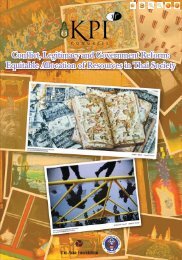SUFFiciENcy EcONOMy ANd GRASSROOtS DEvElOPMENt
SUFFiciENcy EcONOMy ANd GRASSROOtS DEvElOPMENt
SUFFiciENcy EcONOMy ANd GRASSROOtS DEvElOPMENt
You also want an ePaper? Increase the reach of your titles
YUMPU automatically turns print PDFs into web optimized ePapers that Google loves.
186<br />
The Meaning of Sufficiency Economy <br />
International Conference<br />
perceived as behaving irrationally until one considers that she places greater value<br />
on long-term social relationships with market trading partners than a one-time<br />
monetary gain. This concept certainly bears some relation to SE’s condition of<br />
reasonableness in terms of valuing the thought process that contributes to<br />
sustainable livelihoods, but it is more expansive. <br />
Sharing the base—specifically the tangible aspects but possibly also the<br />
intangible—proceeds according to contextually defined values and relations of<br />
power. Gudeman distinguishes between allotment, which is a way of partitioning<br />
permanent resources such as land, and apportionment, which has to do with<br />
divvying up material flows, such as harvests. Communal rules are generally<br />
established to dictate proper allotment and apportionment. For example, official<br />
property rights may be given according to local inheritance laws but usufruct may be<br />
granted under certain circumstances; other goods such as foodstuffs may be<br />
distributed amongst all in a community, or they may flow from all to one, as in a<br />
tributary to a leader, or from all to one, as in a feast hosted by a headman to<br />
redistribute wealth in the community. In this way, access to the base may be<br />
determined by social status, but forms of reallotment and reapportionment can<br />
equalize power differentials. Thus, in these central acts of creating, maintaining, and<br />
sharing the base, the core element is social relationships.<br />
What’s missing from Gudeman’s rich community economy model is ethics that<br />
would mediate these relationships to ensure wellbeing for all individuals, our society<br />
as a whole, and the environment that sustains us. Feminist geographers JK Gibson-<br />
Graham and fellow contributors to the Community Economies Project have been<br />
working to articulate such an approach. This project, coalescing the theoretical and<br />
practical work of academics and real communities, emerged from their shared belief<br />
that more socially just and environmentally sustainable economies are possible, and<br />
that anyone is capable of rethinking and remaking our economies in that direction.<br />
This project is a continuation of Gibson-Graham’s first book, The End of Capitalism<br />
(as we knew it), which deconstructed and critiqued the predominant view of<br />
capitalism as a unified, singular totality so powerful that it cannot be resisted or<br />
transformed and then argued for a cognitive transformation that would liberate the<br />
possibility of economic difference. With their present work (Postcapitalist Politics<br />
and “Community Economies”), Gibson-Graham aim to expound on how to<br />
reimagine and reconstruct our economic worlds.<br />
They begin by discussing how diverse our economic activities actually are,<br />
using an iceberg as a metaphor. The tip of the iceberg, what is visible above water, is<br />
what is usually considered to be the economy: wage labor, market exchange, and<br />
capitalist enterprise; meanwhile, what is beneath the water is less visible but far<br />
more vast: the multitudinous other methods of economic production, transaction,<br />
and distribution we all engage in every day. Gibbson-Graham and their colleagues<br />
have created lists to illustrate these alternatives. For example, instead of or in<br />
addition to traditional market exchange, individuals might practice fair trade, use<br />
alternative currencies, barter, give gifts, or hunt and gather. Instead of mainstream














